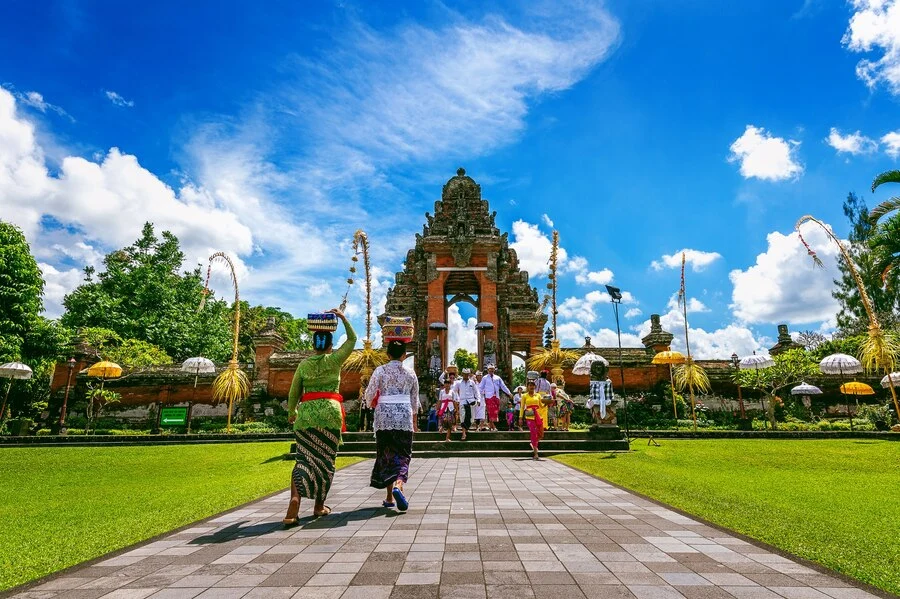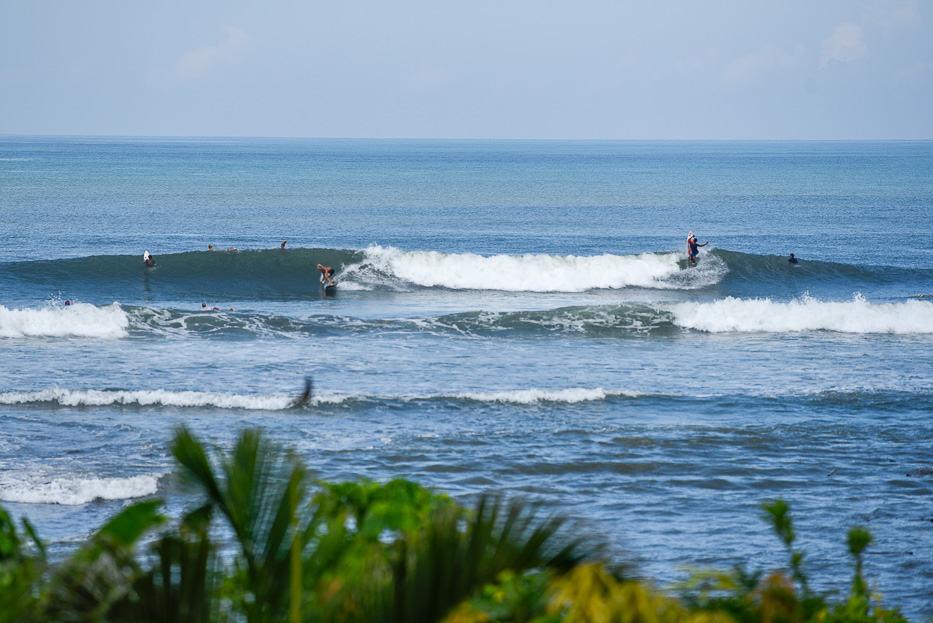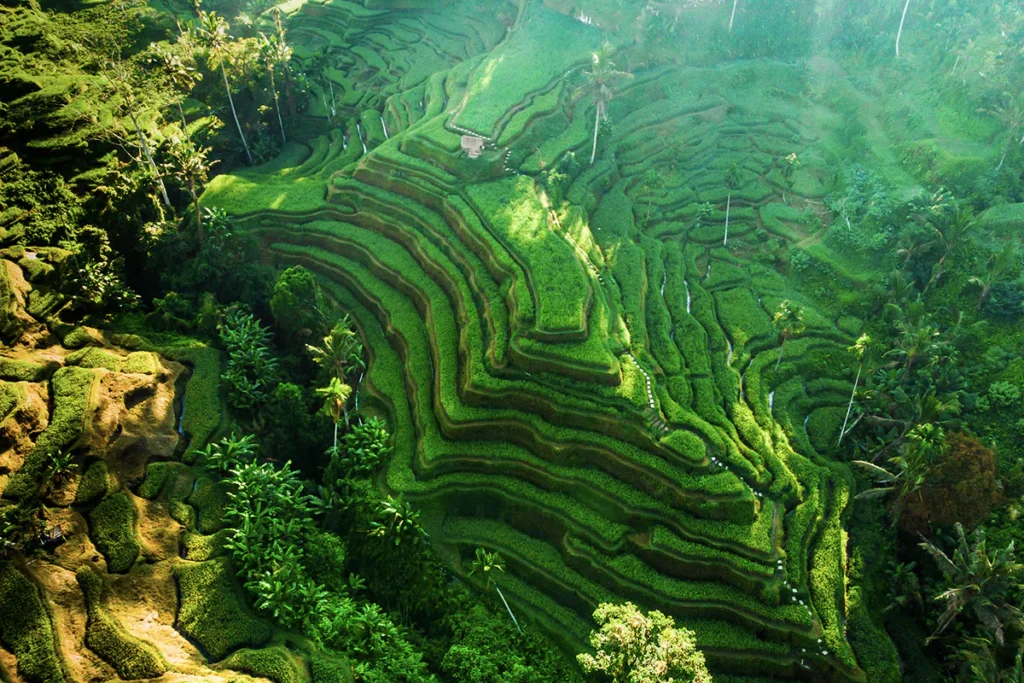Bali, often called the “Island of the Gods,” is a place of extraordinary beauty and profound spirituality. Nestled in the Indonesian archipelago, this small island is world-renowned for its harmonious blend of culture, nature, and modern tourism. A land of contrasts, Bali offers everything from serene temples and misty mountains to vibrant nightlife and pristine beaches. Let’s explore the rich tapestry of experiences that makes Bali a destination unlike any other.
Geography and Natural Beauty
Bali’s geography is as diverse as it is breathtaking. Its landscapes encompass volcanic peaks, terraced rice fields, serene lakes, and expansive coastlines, each contributing to the island’s enchanting charm.
At the heart of Bali’s dramatic topography is Mount Agung, an active volcano that rises 3,031 meters above sea level. Known as the “home of the gods,” it holds immense spiritual significance for the Balinese people. Many rituals are performed here to honor the deities believed to reside within. Another volcanic wonder, Mount Batur, is a favorite among trekkers who ascend its slopes in the early hours to witness a spectacular sunrise.
Bali’s rice terraces, particularly in Tegalalang and Jatiluwih, are more than just picturesque scenes—they represent the ancient Subak irrigation system, which is deeply rooted in the island’s spiritual and communal traditions. These terraces not only sustain agriculture but also symbolize a harmonious relationship between humans and nature.
The beaches of Bali are equally diverse. The golden sands of Seminyak and Jimbaran invite luxury and relaxation, while the black volcanic beaches of Amed and Lovina offer a quieter, more meditative experience. Hidden gems like Green Bowl Beach and Nyang Nyang Beach reward adventurous travelers with secluded coves and untouched beauty.
Waterfalls such as Sekumpul, Banyumala, and Tegenungan are tucked away in lush jungles, creating idyllic spots for nature lovers. These cascading waters provide not only a cooling retreat but also a spiritual connection to Bali’s natural elements.
Cultural Heritage

Bali’s culture is a living, breathing entity that permeates every aspect of daily life. Its unique form of Hinduism, distinct from that practiced in India, is a cornerstone of the island’s identity. This spirituality is expressed through elaborate ceremonies, intricate rituals, and timeless art forms.
Temples are the heart of Balinese culture, with each village hosting at least three temples dedicated to different deities. Among the most revered is Besakih Temple, known as the “Mother Temple,” which sits majestically on the slopes of Mount Agung. Tanah Lot, perched dramatically on a rocky outcrop in the sea, is iconic for its stunning sunset views. Meanwhile, Uluwatu Temple, perched on a cliff overlooking the Indian Ocean, combines natural beauty with cultural depth, especially during its nightly Kecak dance performances.
Daily life in Bali revolves around rituals, most visibly represented by canang sari, small offerings made of flowers, rice, and incense. These offerings, placed in temples, homes, and even streets, symbolize gratitude and maintain harmony between the spiritual and material worlds.
Art and performance are integral to Balinese identity. Traditional dances such as the Barong and Legong tell stories from Hindu epics, brought to life through elaborate costumes and graceful movements. Gamelan orchestras provide a hypnotic soundtrack to these performances, their melodic rhythms deeply resonating with the island’s spiritual essence. Bali’s craftsmanship is equally renowned, from intricate wood carvings and stone sculptures to vibrant Batik and Ikat textiles, which embody the island’s artistic soul.
Festivals in Bali are vibrant and communal celebrations of faith and culture. Galungan and Kuningan mark the victory of good over evil, while Nyepi, the Balinese New Year, is a day of silence and introspection. The Bali Arts Festival and the Ubud Writers & Readers Festival attract international audiences, showcasing the island’s creative spirit.
Tourism and Activities
Bali’s appeal lies in its ability to cater to every type of traveler, whether you seek adventure, relaxation, or cultural immersion.

For thrill-seekers, Bali offers a range of activities. Surfing is a way of life on beaches like Kuta and Uluwatu, where consistent waves attract surfers from around the globe. Scuba diving and snorkeling unveil vibrant coral reefs, with spots like Nusa Lembongan and Tulamben’s USAT Liberty wreck providing unforgettable underwater experiences. Hiking enthusiasts can conquer Mount Batur or explore the lush trails of Munduk and Sidemen.
Those seeking serenity will find it in Bali’s wellness retreats and spas. Ubud is a haven for yoga practitioners and spiritual seekers, with its tranquil setting fostering a deep connection to mind and body. Traditional Balinese massage, incorporating long strokes and acupressure, is a rejuvenating experience rooted in ancient healing practices.
Bali’s culinary landscape is as diverse as its geography. From traditional dishes like babi guling (suckling pig) and lawar to international fusion cuisine, the island offers a feast for the senses. Warungs, or local eateries, provide authentic flavors at affordable prices, while fine dining establishments in Seminyak and Ubud redefine Indonesian gastronomy.
The island’s vibrant nightlife adds another layer of excitement. Beach clubs like Potato Head and Finns offer a perfect blend of music, cocktails, and sunsets, while Seminyak’s rooftop bars and Canggu’s laid-back lounges cater to a range of tastes. For a cultural evening, the Kecak and Barong dances performed in temple settings are unforgettable.
Climate and Seasons
Bali’s tropical climate ensures warm temperatures year-round, with the dry season from April to October offering ideal conditions for outdoor activities and exploration. The wet season, from November to March, brings lush greenery and occasional rain showers, which often enhance the island’s natural beauty rather than detract from it.
The Balinese People and Traditions
The people of Bali are renowned for their warmth, hospitality, and adherence to tradition. Community life is organized around the Banjar, a local council that governs everything from ceremonies to communal responsibilities. This close-knit structure ensures that Balinese traditions are preserved across generations.
Nyepi, the “Day of Silence,” is one of the most unique cultural experiences Bali offers. On this day, the entire island comes to a halt—no flights, no work, no lights. The silence is meant for introspection and spiritual cleansing, creating an atmosphere of profound peace.
The philosophy of Tri Hita Karana—harmony with God, people, and nature—guides every aspect of Balinese life. This outlook fosters not only spiritual balance but also environmental consciousness, which is increasingly vital as the island navigates the challenges of modern tourism.
Why Visit Bali?
Bali is more than just a destination; it is a transformative experience. From its stunning landscapes and spiritual depth to its vibrant culture and warm people, Bali offers something for everyone. Whether you come for the adventure, the serenity, or the chance to immerse yourself in a unique way of life, Bali promises to leave an indelible mark on your heart and soul.




